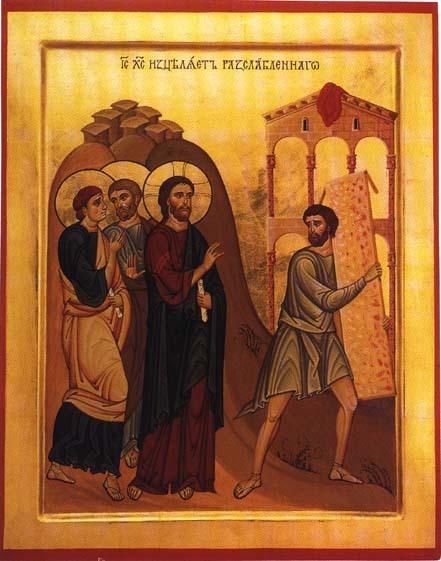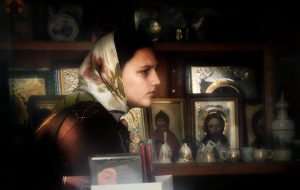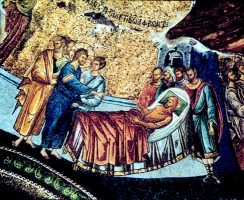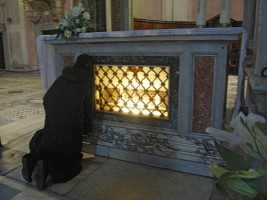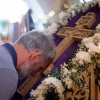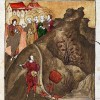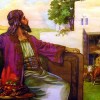At that time, Jesus entered into a ship, and passed over, and came into His own city. And, behold, they brought to Him a man sick of the palsy, lying on a bed: and Jesus seeing their faith said unto the sick of the palsy, “Son, be of good cheer; thy sins be forgiven thee.” And, behold, certain of the scribes said within themselves, “This Man blasphemeth.” And Jesus knowing their thoughts said, “Wherefore think ye evil in your hearts? For whether is easier, to say, ‘Thy sins be forgiven thee’; or to say, ‘Arise, and walk’? But that ye may know that the Son of Man hath power on earth to forgive sins,” (then saith He to the sick of the palsy,) “Arise, take up thy bed, and go into thine house.” And he arose, and departed to his house. But when the multitudes saw it, they marveled, and glorified God, which had given such power unto men (Matthew 9:1-8).
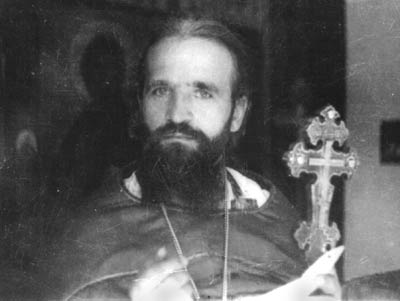 He hath borne our infirmities and carried our sicknesses (Isaiah 53:4). After the healing of the Gardarene demoniacs, the Savior came to Capernaum and immediately went to the synagogue, where a multitude of people had assembled to hear the great Preacher of Good Tidings. Here the Savior’s preaching was interrupted by an unfortunate man who, possessed by the power of evil, was unable to endure the presence of the Son of God, Who had come to overthrow the kingdom of evil. A frenzied and piercing cry suddenly sounded forth from the peaceful silence: Let us alone; what have we to do with Thee, Thou Jesus of Nazareth? art Thou come to destroy us? I know Who Thou art, the Holy One of God (cf. Mark 1:21-28; Luke 4:31-37).
He hath borne our infirmities and carried our sicknesses (Isaiah 53:4). After the healing of the Gardarene demoniacs, the Savior came to Capernaum and immediately went to the synagogue, where a multitude of people had assembled to hear the great Preacher of Good Tidings. Here the Savior’s preaching was interrupted by an unfortunate man who, possessed by the power of evil, was unable to endure the presence of the Son of God, Who had come to overthrow the kingdom of evil. A frenzied and piercing cry suddenly sounded forth from the peaceful silence: Let us alone; what have we to do with Thee, Thou Jesus of Nazareth? art Thou come to destroy us? I know Who Thou art, the Holy One of God (cf. Mark 1:21-28; Luke 4:31-37).
Last Sunday we heard these same words, spoken to the Savior, from the mouths of the Gadarene demoniacs. Just as with the Gadarene demoniacs, here in the synagogue there was hysterical shouting; there were slaves and instruments of an evil power, of an unclean spirit. Christ, turning to the raging sufferer, spoke a stern command to the evil spirit that had overwhelmed him: Hold thy peace, and come out of him. The unfortunate one, screaming and writhing in terrible convulsions, fell to the ground… And then he arose healthy and in his right mind.
Departing from the synagogue after this astonishing miracle, Christ went to His home to rest. But when the hours of the Sabbath rest had come to an end, a multitude of people crowded into his home and at the door of His modest dwelling, bringing with them the possessed and people with all manner of sicknesses. Christ, having compassion for the suffering, healed them.
Not everyone who stood in need of the Physician of souls and bodies was able to make their way into the Savior’s home. Now porters brought to the doors of His house a paralytic who had completely lost the use of his limbs and given up all hope of receiving help from earthly physicians. All his remaining hope was in the Divine Physician, to Whom he was unable to find his way. Then a thought flashed through the sick man’s soul and he ordered his porters to lift him onto the roof and, making an opening therein, to lower him on ropes along with his bed to the feet of the Savior, the Divine Physician and Teacher. This courage revealed the sick man’s great boldness of faith. In response to his fervent prayer for healing – a prayer that showed forth in the sick man’s eyes – there came forth Christ’s merciful reply: Son, be of good cheer; thy sins be forgiven thee. Your illness is the consequence of sins, the Savior told the paralytic.
For his boldness of faith, the sick man received not only the healing of body, but also the forgiveness of sins. But this is not how the scribes who were present understood Christ’s words: This Man blasphemeth, they said to themselves. Their thoughts did not escape the attention of the Seer-of-Hearts, Who knowing their thoughts, said: “Wherefore think ye evil in your hearts? For whether is easier to say, ‘Thy sins be forgiven thee’; or to say, ‘Arise, and walk’? But that ye may know that the Son of Man hath power on earth to forgive sins,” (then saith He to the sick of the palsy,) “Arise, take up thy bed, and go into thine house.” Then the sick man arose, took up his bed, and went home completely healthy. Seeing this, the people glorified God.
Thus, dear brother and sisters, if sickness is often a consequence of sin, recovery from sickness often depends not only on doctors and medicines, but also on the faith of the sick person, his repentance, and his resolve to correct his life. This applies not only to personal ailments, but also to the sicknesses of families and entire societies.
By faith our hearts are opened to receiving God’s power, and by repentance we are made capable of receiving this power. Then our infirmities will be touched by the healing Right Hand of Him of whom the Prophet Isaiah said: He hath borne our infirmities and carried our sicknesses (Isaiah 53:4). Amen.












